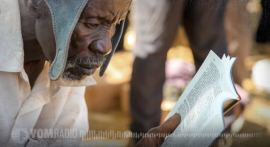
The Trump administration issued a new executive order on Monday, revising a previous executive order regarding the entry of refugees from several countries in the Middle East and Africa.
Called the "Executive Order Protecting The Nation From Foreign Terrorist Entry Into The United States," the order took into consideration the numerous legal issues that came about with the previous executive order, and loosened certain restrictions on entry into the U.S.
For instance, those who lawfully obtained visas and those who have already been granted asylum are no longer under the 90-day entry ban.
While the previous executive order restricted entry for 90 days from seven countries, the new executive order reduced that restriction to six countries, including Iran, Libya, Somalia, Syria, Sudan, and Yemen. Iraq, which was previously part of the seven restricted countries, has been taken off of that list.
The indefinite entry ban for those coming from Syria has also been lifted, and those from Syria will now not be allowed to enter the U.S. for 120 days.
The country's refugee program has also been halted for a 120 days, just like the previous executive order had stated, in order to give the U.S. government time to evaluate and develop its vetting program.
The new executive order limits the number of refugees to be granted entry into the U.S. to 50,000. Under the Obama administration, that number was 110,000.
Of concern to some conservative activists was a removal of language that religious minorities would be prioritized, a portion in the previous executive order which was criticized by some as being discriminatory.
The newly released executive order will take into consideration "fear of persecution or torture," but does not explicitly prioritize religious minorities. It also states that the previous order "did not provide a basis for discriminating for or against members of any particular religion."
"While that order allowed for prioritization of refugee claims from members of persecuted religious minority groups, that priority applied to refugees from every nation, including those in which Islam is a minority religion, and it applied to minority sects within a religion," the order states. "That order was not motivated by animus toward any religion."
Advocates for prioritizing religious minorities argued that it is necessary because they are facing genocide and targeted attacks in their respective countries.
Andrew Walther, the vice president of communications for the Knights of Columbus, wrote in the Morning Consult that the Obama administration also prioritized offering help to religious minorities such as Christians, Yazidis, and Shia Muslims.
"It is not un-American to prioritize those who have been targeted for genocide because of their faith," Walther wrote. "It has been seen as quintessentially American for a century. And religious persecution has long been a key qualifier for refugee status under our immigration laws."
This new executive order takes effect on March 16.

















